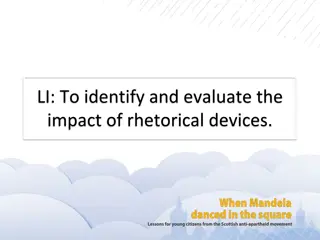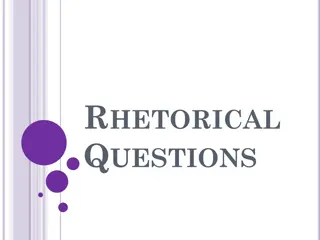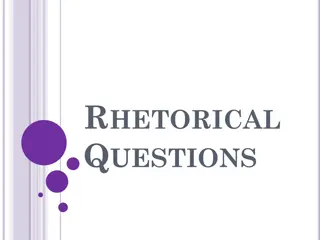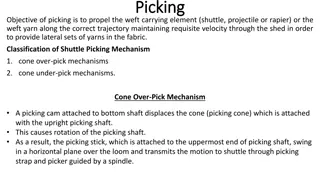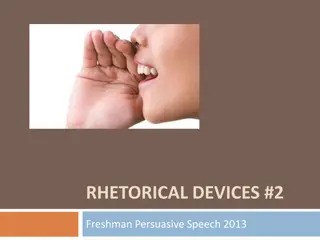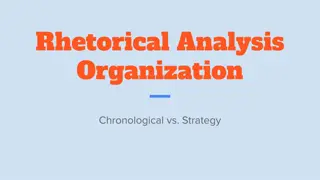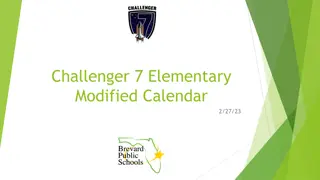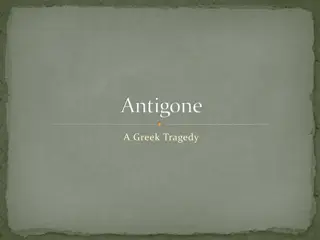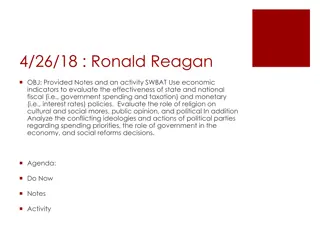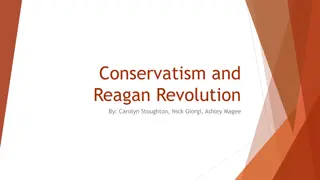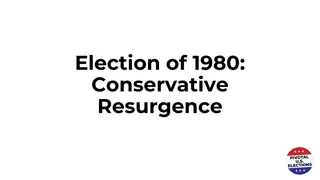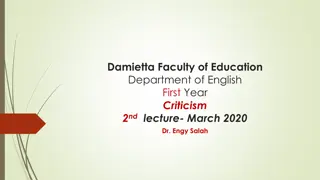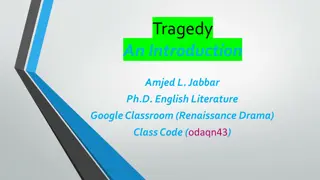Analyzing Ronald Reagan's Rhetorical Approach in The Space Shuttle Challenger Tragedy Address
Explore the rhetorical analysis of Ronald Reagan's address following the Space Shuttle Challenger tragedy. The analysis delves into the speech's purpose, Reagan's handling of blame, balancing tragedy with exploration, and the importance of leaders addressing the nation in times of crisis.
Uploaded on Sep 25, 2024 | 0 Views
Download Presentation

Please find below an Image/Link to download the presentation.
The content on the website is provided AS IS for your information and personal use only. It may not be sold, licensed, or shared on other websites without obtaining consent from the author. Download presentation by click this link. If you encounter any issues during the download, it is possible that the publisher has removed the file from their server.
E N D
Presentation Transcript
The Space Shuttle Challenger Tragedy Address by Ronald Reagan Rhetorical Analysis
1. What is the purpose of the speech? To honor both NASA program and the crew Sub purpose: to calm the American public and to reassure the public s faith in space exploration
2. How does Reagan address peoples need to find blame? He explains that part of space exploration is taking a chance and expanding man s horizons.
3. How does Reagan balance the tragedy with the importance of science and exploration? IS he effective? In his speech, Reagan reveres the crew and emphasizes the importance of error in exploration.
4. Why is it important in times of tragedy that leaders address the nation? You write a response!
1. What words and phrases are used to describe the tragedy? National loss, day of mourning and remembering
2. Who is the audience? Is there more than one? Name them. American public -> adults, children, families of seven, NASA.
3. What is the purpose of including the reference to his wife? Reagan includes the line about he and Nancy sharing the pain to portray himself as a family man who understands loss. This is an effective form of ethos: building common ground.
4. What words and phrases are used to describe the astronauts? Daring, brave, special spirit and grace, pioneers
7. What is the effect of including the reference to Sir Francis Drake and the historian s comment about him? This is a form of logos. Reagan celebrates the crew by drawing a parallel between them and the great explorer, Sir Francis Drake, who lived by the sea, died on it, and was buried in it. Both the crew and Drake are remembered for their dedication.
Rhetorical Devices (Write these down!) Rhetorical Devices (Write these down!) ELP (Ethos, Logos, and Pathos) Allusion Simile Diction Parallel Structure Appeal to Country Appeal to Faith SOAPSTONE Addressing Specific Audiences
Ronald Reagan The Space Shuttle "Challenger" Tragedy Address Ladies and Gentlemen, I'd planned to speak to you tonight to report on the state of the Union, but the events of earlier today have led me to change those plans. Today is a day for mourning and remembering. Nancy and I are pained to the core by the tragedy of the shuttle Challenger. We know we share this pain with all of the people of our country. This is truly a national loss. PARAGRAPH 1
Ronald Reagan Possible Tone Words: Solemn Sympathetic Formal Encouraging The Space Shuttle "Challenger" Tragedy Address Ladies and Gentlemen, I'd planned to speak to you tonight to report on the state of the Union, but the events of earlier today have led me to change those plans. Today is a day for mourning and remembering. Nancy and I are pained to the core by the tragedy of the shuttle Challenger. We know we share this pain with all of the people of our country. This is truly a national loss. Occasion: the explosion Ethos: Common Ground Reagan is a family man *Notice* In order to gain the trust of the American people, Reagan portrays himself and his wife as common Americans, who are also hurt by this Challenger Explosion. The term national loss suggests that the whole country has been affected together. Ethos: Common Ground PARAGRAPH 1
Nineteen years ago, almost to the day, we lost three astronauts in a terrible accident on the ground. But we've never lost an astronaut in flight. We've never had a tragedy like this. And perhaps we've forgotten the courage it took for the crew of the shuttle. But they, the Challenger Seven, were aware of the dangers, but overcame them and did their jobs brilliantly. We mourn seven heroes: Michael Smith, Dick Scobee, Judith Resnik, Ronald McNair, Ellison Onizuka, Gresorv Jarvis, and Christa McAuliffe. We mourn their loss as a nation together. PARAGRAPH 2
Diction: Positive Connotation Nineteen years ago, almost to the day, we lost three astronauts in a terrible accident on the ground. But we've never lost an astronaut in flight. We've never had a tragedy like this. And perhaps we've forgotten the courage it took for the crew of the shuttle. But they, the Challenger Seven, were aware of the dangers, but overcame them and did their jobs brilliantly. We mourn seven heroes: Michael Smith, Dick Scobee, Judith Resnik, Ronald McNair, Ellison Onizuka, Gresorv Jarvis, and Christa McAuliffe. We mourn their loss as a nation together. Ethos: Common Ground PARAGRAPH 2
For the families of the seven, we cannot bear, as you do, the full impact of this tragedy. But we feel the loss, and we're thinking about you so very much. Your loved ones were daring and brave, and they had that special grace, that special spirit that says, "Give me a challenge, and I'II meet it with joy." They had a hunger to explore the universe and discover its truths. They wished to serve, and they did. They served all of us. We've grown used to wonders in this century. It's hard to dazzle us. But for twenty-five years the United States space program has been doing just that. We've grown used to the idea of space, and, perhaps we forget that we've only just begun. We're still pioneers. They, the members of the Challenger crew, were pioneers. PARAGRAPH 3-4
For the families of the seven, we cannot bear, as you do, the full impact of this tragedy. But we feel the loss, and we're thinking about you so very much. Your loved ones were daring and brave, and they had that special grace, that special spirit that says, "Give me a challenge, and I'II meet it with joy." They had a hunger to explore the universe and discover its truths. They wished to serve, and they did. They served all of us. Diction: Positive Connotation *Note* Give me a challenge, and I ll meet it with joy is the play on words with Challenger. Parallel Structure Logos: a statistic for support We've grown used to wonders in this century. It's hard to dazzle us. But for twenty-five years the United States space program has been doing just that. We've grown used to the idea of space, and, perhaps we forget that we've only just begun. We're still pioneers. They, the members of the Challenger crew, were pioneers. Diction: Strategic Word Choice labeling Americans and the Crew as pioneers to emphasize the new discoveries of space exploration and the justification for error. PARAGRAPH 3-4
And I want to say something to the schoolchildren of America who were watching the live coverage of the shuttle's take-off. I know it's hard to understand, but sometimes painful things like this happen. It's all part of the process of exploration and discovery. It's all part of taking a chance and expanding man's horizons. 'The future doesn't belong to the fainthearted; it belongs to the brave. The Challenger crew was pulling us into the future, and we'll continue to follow them. PARAGRAPH 5
Addressing a specific audience And I want to say something to the schoolchildren of America who were watching the live coverage of the shuttle's take-off. I know it's hard to understand, but sometimes painful things like this happen. It's all part of the process of exploration and discovery. It's all part of taking a chance and expanding man's horizons. 'The future doesn't belong to the fainthearted; it belongs to the brave. The Challenger crew was pulling us into the future, and we'll continue to follow them. *Notice* He changes the way he speaks here, making the language gentler and understandable for a younger audience. EXPLANATION & JUSTIFICATION Logos: logical reasoning / cause and effect Diction/Pathos PARAGRAPH 5
I've always had great faith in and respect for our space program. And what happened today does nothing to diminish it. We don't hide our space program. We don't keep secrets and cover things up. We do it all up front and in public. That's the way freedom is, and we wouldn't change it for a minute. We'll continue our quest in space. There will be more shuttle flights and more shuttle crews and, yes, more volunteers, more civilians, more teachers in space. Nothing ends here; our hopes and our journeys continue. I want to add that I wish I could talk to every man and woman who works for NASA, or who worked on this mission and tell them: "Your dedication and professionalism have moved and impressed us for decades. And we know of your anguish. We share it." PARAGRAPH 6-8
I've always had great faith in and respect for our space program. And what happened today does nothing to diminish it. We don't hide our space program. We don't keep secrets and cover things up. We do it all up front and in public. That's the way freedom is, and we wouldn't change it for a minute. Appeal to country (patriotic appeal) Pathos Parallel Structure We'll continue our quest in space. There will be more shuttle flights and more shuttle crews and, yes, more volunteers, more civilians, more teachers in space. Nothing ends here; our hopes and our journeys continue. Addressing a specific audience I want to add that I wish I could talk to every man and woman who works for NASA, or who worked on this mission and tell them: "Your dedication and professionalism have moved and impressed us for decades. And we know of your anguish. We share it." Ethos: Common Ground PARAGRAPH 6-8
There's a coincidence today. On this day three hundred and ninety years ago, the great explorer Sir Francis Drake died aboard ship off the coast of Panama. In his lifetime the great frontiers were the oceans, and a historian later said, "He lived by the sea, died on it, and was buried in it." Well, today, we can say of the Challenger crew: Their dedication was, like Drake's, complete. The crew of the space shuttle Challenger honored us by the manner in which they lived their lives. We will never forget them, nor the last time we saw them, this morning, as they prepared for their journey and waved goodbye and "slipped the surly bonds of earth" to "touch the face of God." PARAGRAPH 9-10
There's a coincidence today. On this day three hundred and ninety years ago, the great explorer Sir Francis Drake died aboard ship off the coast of Panama. In his lifetime the great frontiers were the oceans, and a historian later said, "He lived by the sea, died on it, and was buried in it." Well, today, we can say of the Challenger crew: Their dedication was, like Drake's, complete. Allusion Logos Allusion Pathos/Appeal to Faith Ethos: Building Common Ground through Religion The crew of the space shuttle Challenger honored us by the manner in which they lived their lives. We will never forget them, nor the last time we saw them, this morning, as they prepared for their journey and waved goodbye and "slipped the surly bonds of earth" to "touch the face of God." *This is used to comfort the audience PARAGRAPH 9-10
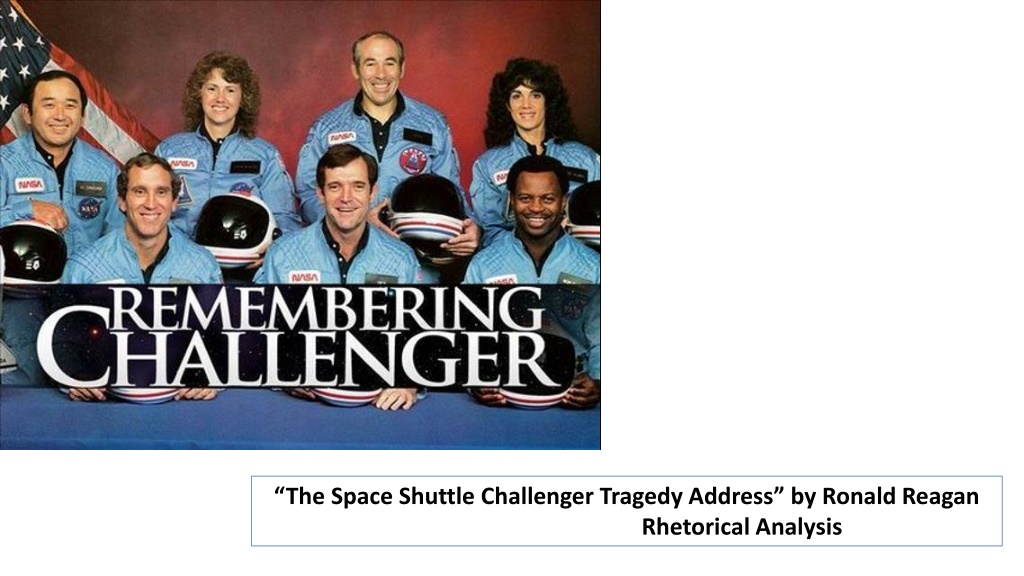

![Read⚡ebook✔[PDF] Linking the Space Shuttle and Space Stations: Early Docking Te](/thumb/21519/read-ebook-pdf-linking-the-space-shuttle-and-space-stations-early-docking-te.jpg)
![[PDF⚡READ❤ONLINE] Energiya-Buran: The Soviet Space Shuttle (Springer Praxis Book](/thumb/21613/pdf-read-online-energiya-buran-the-soviet-space-shuttle-springer-praxis-book.jpg)
![Read⚡ebook✔[PDF] The Untold Stories of the Space Shuttle Program: Unfulfilled D](/thumb/21685/read-ebook-pdf-the-untold-stories-of-the-space-shuttle-program-unfulfilled-d.jpg)

